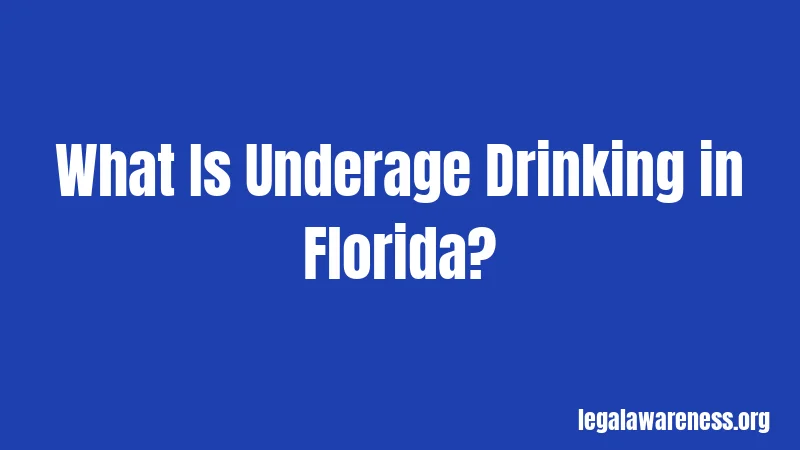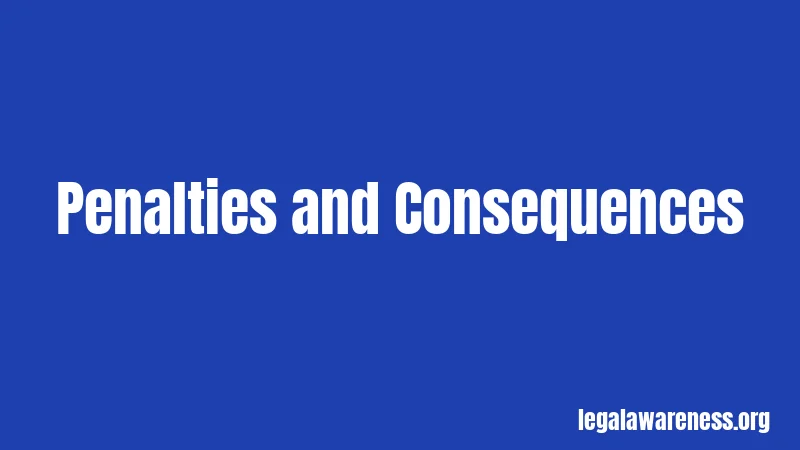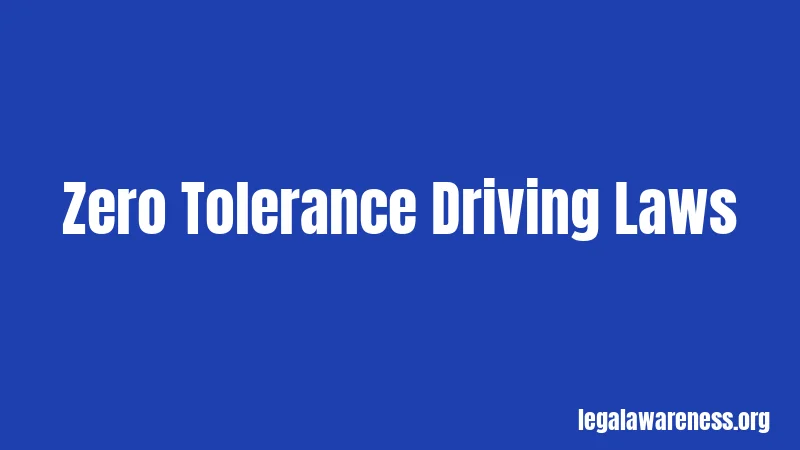Minor Drinking Laws in Florida (2026): What You Need to Know
Florida has some of the strictest underage drinking laws in the United States. These laws protect young people from the dangers of early alcohol use. They also carry serious penalties that can affect your future.
Understanding these laws is important for teens, parents, and anyone who serves alcohol. Breaking these rules can lead to jail time, heavy fines, and a permanent criminal record. The penalties can follow you for years.
What Is Underage Drinking in Florida?

Underage drinking means any person under 21 years old possessing or drinking alcohol. Florida law is very clear about this. The legal drinking age is 21 years old, with no exceptions.
Florida takes alcohol violations seriously. A first underage drinking offense carries a $500 fine and up to 60 days in jail. Even holding an unopened beer can get you in trouble if you’re under 21.
This is different from some other states. Florida does not allow parents to give alcohol to their own children. It does not matter if you are at home or have parental permission.
Basic Underage Drinking Laws
Possession of Alcohol
Under Florida Statute § 562.111, it is illegal for anyone under 21 years old to have alcohol in their possession. Even if the alcohol is unopened or belongs to someone else, minors can still face legal consequences.
You don’t have to be drinking the alcohol to break this law. Simply holding it is enough. This includes beer, wine, liquor, and mixed drinks.
The law covers two types of possession. Actual possession means the alcohol is in your hands or pockets. Constructive possession means the alcohol is nearby and you have control over it.
Giving Alcohol to Minors
Under Florida Statute § 562.11, anyone who sells, gives, or serves alcohol to a person under 21 years old can be charged with a second-degree misdemeanor. This includes parents, friends, and strangers.
Adults cannot buy alcohol for minors. They cannot let minors drink at their homes. They cannot allow underage drinking at parties they host.
Penalties and Consequences

First Offense
A first-time offense is a second-degree misdemeanor, punishable by up to 60 days in jail, six months of probation, and a $500 fine.
You will also lose your driver’s license for at least six months. This happens even if you weren’t driving when caught with alcohol.
Second Offense
A second offense can be a first-degree misdemeanor involving up to one year in prison and a $1,000 fine.
Second-time offenders face longer license suspensions. They may also get up to one year in jail.
Fake ID Penalties
Using a fake ID to buy alcohol can result in a felony charge with up to five years in prison and a $5,000 fine.
Fake ID charges are very serious in Florida. They can follow you for life and affect jobs and college applications.
Driver’s License Suspensions
Florida law requires automatic license suspensions for underage drinking. These suspensions happen even if you weren’t driving.
First Offense Suspension
Your license gets suspended for 6 to 12 months on a first offense. If you’re not old enough to drive yet, you can’t get a license for 6 to 12 months after you turn 16.
Second Offense Suspension
Second-time offenders face two-year license suspensions. Young people who can’t drive yet must wait two years after turning 16 to get their license.
Zero Tolerance for Driving
Florida has a zero-tolerance policy for underage drinking and driving. The Florida Department of Highway Safety and Motor Vehicles (FLHSMV) has the authority to immediately suspend the license of any driver under 21 caught with a blood alcohol concentration (BAC) of 0.02% or higher.
This is much lower than the 0.08% limit for adults. Even the slightest trace of alcohol in an underage driver’s system (0.02% BAC or more) can trigger a license suspension.
Zero Tolerance Driving Laws

BAC Limits
Florida’s Zero Tolerance law prohibits drivers under 21 from operating a vehicle with a BAC of 0.02% or higher. One drink can put you over this limit.
Adults can drive with a BAC up to 0.08%. But anyone under 21 faces penalties at just 0.02%. This shows how serious Florida is about underage drinking and driving.
License Suspension for DUI
Drivers under the age of 21 with a blood alcohol level of 0.02 percent or more will have their license immediately suspended for six months. This administrative action is for a first offense. A second offense will result in a one-year suspension.
Refusing Tests
A first offense for refusal to submit to breath, urine, or blood test will result in a 12-month suspension. A second offense will result in an 18-month suspension.
Refusing a breathalyzer test makes things worse. The penalties are more severe than taking the test and failing.
Special Circumstances
Work Exceptions
The law prohibiting the possession of alcohol by a person under 21 does not apply to “the employment of any person 18 years of age or older in the sale, preparation, or service of alcoholic beverages in licensed premises.”
People 18 and older can serve alcohol at restaurants and bars. But they still cannot drink it. They also cannot pour drinks – you must be 21 to pour alcohol.
College Tasting Exception
The law prohibiting the possession of alcohol by person under 21 does not apply to “the tasting of alcoholic beverages by a student who is at least 18 years of age, who is tasting the alcoholic beverages as part of the student’s required curriculum at a postsecondary educational institution.”
This exception is very limited. It only applies to required college courses. Students can taste but not drink the alcohol. It must be supervised by someone 21 or older.
Religious Exceptions
The only exception is for alcohol used as part of a legally-protected religious observance.
Some religious ceremonies may involve alcohol. This is the only time minors can legally consume alcohol in Florida.
No Parental Exception
Unlike other states, Florida does not allow parents to authorize underage alcohol possession at home, and it prohibits selling or giving alcohol to minors, even if it is parents buying alcohol for minors.
Parents cannot give their children alcohol in Florida. This is true even at home or during special occasions. Parents who allow underage drinking can face criminal charges.
Social Host Liability
Party Hosts
Social Hosts: Adults who host parties at home can also be responsible if minors drink alcohol at their events.
Adults who host parties must prevent underage drinking. If they know minors are drinking and don’t stop it, they can be charged with crimes.
Social host law is specifically limited to underage drinking parties. Action by underage guest that triggers violation: Possession Consumption… Standard for hosts’ knowledge or action regarding the party: KNOWLEDGE – host must have actual knowledge of the occurrence.
Penalties for Social Hosts
Criminal Charges: Serving alcohol to a minor is a second-degree misdemeanor, which can mean up to 60 days in jail and a $500 fine.
Social hosts also face lawsuits if someone gets hurt. They may have to pay damages and medical bills.
How to Stay Legal
For Teens
Don’t possess any alcoholic beverages if you’re under 21. This includes holding drinks for friends or keeping alcohol in your car.
Never use a fake ID. The penalties are much worse than underage drinking charges.
If you’re at a party where people are drinking, leave. Being around alcohol when you’re underage can still get you in trouble.
For Parents
Don’t give alcohol to your children. Don’t allow drinking parties at your home. Train yourself and older family members about Florida’s strict laws.
Talk to your teens about the serious consequences of underage drinking. Make sure they understand the long-term effects on their future.
For Business Owners
Always Check IDs: Businesses should train employees to check IDs and refuse service to minors.
Train your employees well. Make sure they understand the law and know how to spot fake IDs.
Report Fake IDs: If someone tries to use a fake ID to buy alcohol, report it to the police.
Long-Term Consequences
Criminal Record
If you are convicted for underage possession of alcohol in Florida, you will have a permanent criminal record that may hinder your future educational and employment opportunities.
A criminal record can affect your whole life. It can prevent you from getting certain jobs. It can hurt your chances of getting into college or graduate school.
College and Career Impact
Many universities have strict policies on alcohol violations, so if you are in college and pick up an underage drinking charge, it could lead to suspension or expulsion from the institution.
Underage drinking charges can end your college career. They can also affect professional licenses and job applications.
Insurance and Other Costs
Having an alcohol-related conviction can increase your car insurance rates. It may also affect other types of insurance coverage.
Some employers run background checks. An underage drinking conviction could cost you job opportunities for years.
Defenses Against Charges
Common Defenses
Some potential defenses against alcohol-related charges could be arguing lack of knowledge that the beverage was alcoholic or that the alcoholic beverage was in your presence.
You might have a defense if you didn’t know you had alcohol. You might also have a defense if someone put alcohol near you without your knowledge.
If a mixed drink has less than 0.05% alcohol by volume, it is not considered alcoholic under Florida law.
The alcohol content matters. Very low alcohol drinks may not count under the law.
Procedural Defenses
Lack of a warrant or probable cause to enter the premises.
Police must follow proper procedures. If they searched illegally, the evidence might not be usable in court.
Getting Legal Help
Why You Need a Lawyer
If you or your child has been charged with underage possession of alcohol in South Florida, then it is in your best interests to consult with a Miami criminal defense lawyer or a Fort Lauderdale criminal defense lawyer who has experience defending clients against such charges.
Don’t try to handle these charges alone. The laws are complex and the penalties are serious.
Under no circumstances should you plead guilty to an underage possession of alcohol charge without speaking to a Miami criminal defense attorney or Fort Lauderdale criminal defense attorney first.
Never plead guilty without talking to a lawyer first. You may have defenses you don’t know about.
Administrative Hearings
If caught under the Zero Tolerance Law, you have 10 days to request a formal review hearing to contest the suspension.
You can fight license suspensions. But you must act quickly. Missing the deadline means you lose this chance.
Frequently Asked Questions
Can parents give alcohol to their own children in Florida?
No. In some states, it is legal for parents to permit their underage children to drink alcohol under parental supervision at home. Not so in Florida. Florida has no parental exception to underage drinking laws.
What happens if I refuse a breathalyzer test?
If the driver refuses to take a breath or blood test, the law mandates a one-year license suspension for a first refusal and an 18-month suspension for subsequent refusals. Refusing the test makes penalties worse, not better.
Can I get a hardship license after an underage drinking suspension?
In some cases, yes. But the rules are strict. You may only be able to drive to work, school, or medical appointments. This depends on your specific situation and whether you refused testing.
How long do these charges stay on my record?
Underage drinking convictions create permanent criminal records in Florida. They don’t automatically disappear when you turn 21. You may need legal help to seal or expunge the record later.
What if I’m caught holding alcohol for someone else?
It doesn’t matter whose alcohol it is. Even if the alcohol is unopened or belongs to someone else, minors can still face legal consequences. Possession is possession under Florida law.
Final Thoughts
Florida’s underage drinking laws are among the toughest in the nation. The state does not tolerate any alcohol possession or consumption by people under 21. The penalties can affect your life for years.
The best strategy is simple: don’t drink if you’re under 21. Don’t possess alcohol and don’t go to parties where underage drinking happens. The temporary fun is not worth the permanent consequences.
If you do face charges, get legal help immediately. Don’t try to handle it yourself. An experienced lawyer can protect your rights and help minimize the damage to your future.
Remember that these laws exist to keep young people safe. Alcohol affects developing brains differently than adult brains. The restrictions help prevent accidents, injuries, and other serious problems.
References
- Florida Statutes § 562.111 – Possession of alcoholic beverages prohibited; penalty
- Florida Statutes § 562.11 – Selling, giving, or serving alcoholic beverages to persons under 21
- Florida Statutes § 322.2616 – Suspension of license for persons under 21
- Florida Department of Highway Safety and Motor Vehicles – Teens & Young Adults with DUIs
- Florida Alcohol Laws: Ultimate 2025 Guide
